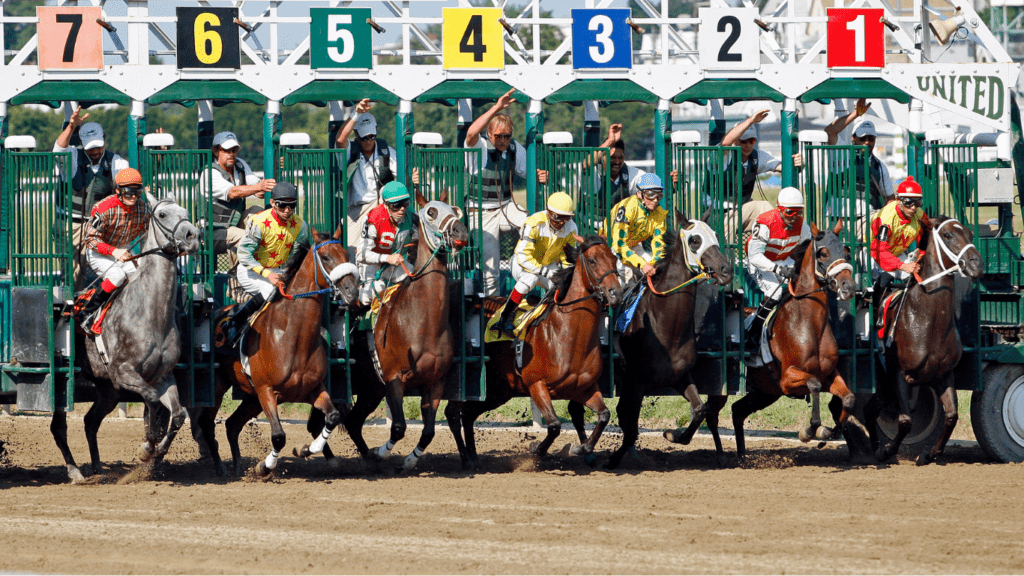Understanding Horse Racing Betting
Navigating horse racing betting requires familiarity with its unique terms and bet types. I’ll break these down to help bettors make informed decisions.
Key Terminology
- Odds: Odds indicate the likelihood of a horse winning and determine potential payouts. Lower odds suggest a horse is more favored to win.
- Purse: This is the total prize money awarded in a race. It can influence the quality of the participating horses.
- Post Position: This refers to a horse’s starting gate position. Certain positions might offer strategic advantages based on track layout.
- Scratch: A horse removed from a race is termed a scratch. Betting strategies may need adjustments if a key horse is scratched.
- Win: A straightforward bet where a bettor wins only if their chosen horse finishes first. Simple but with lower payouts compared to complex bets.
- Place: With a place bet, the horse must finish first or second, offering a higher chance of winning but smaller returns than a win bet.
- Show: This bet gains a win if the selected horse finishes first, second, or third. It’s a safe option with modest payouts.
- Exacta: Bettors predict the first two finishers in the exact order. The risk increases, but so does the payout.
- Trifecta: Requires picking the first three horses in exact order. Offers high reward potential but stands as more challenging.
Understanding these fundamental concepts and bet types allows strategic choices that can elevate betting success at horse races.
Strategy 1: The Dutching Technique
The Dutching Technique offers a practical way to maximize returns when betting on horse races. It involves spreading the risk across multiple horses in a single race to increase the chance of winning.
Benefits of Dutching
Dutching reduces risk by diversifying bets among several horses rather than relying on a single outcome. It increases the probability of winning with a balanced stake distribution. When executed correctly, it ensures a consistent profit if any of the selected horses win. Bettors find this approach valuable as it taps into various potential outcomes, making it a versatile strategy.
Implementing the Strategy
Successful Dutching requires precise calculations and prior research on participating horses. First, identify races where odds indicate a strong potential for multiple contenders to perform well. Next, determine the stakes for each horse, ensuring potential returns are balanced. Tools and software facilitate these calculations by helping track odds and automating stake distribution, making the process more efficient. Practice and attention to detail enhance mastery of this technique, transforming probabilities into profits.
Strategy 2: Value Betting
Value betting stands out as a method that involves finding bets where the odds offered surpass the actual probability of the outcome. This strategy seeks to capitalize on discrepancies between bookmaker odds and true probabilities.
Identifying Value Bets
Identifying these bets requires a thorough analysis of the horses and the race conditions. I always start by comparing my own assessments of the probability of a horse winning with the odds provided by bookmakers. When my estimated odds suggest a higher probability than those offered, I consider it a potential value bet. Past performances, track conditions, and horses’ form are key factors I evaluate. By continually refining my assessment process, I enhance my ability to spot these valuable opportunities.
Risk Management
Effective risk management is essential for capitalizing on value bets without exposing myself to undue losses. I allocate a fixed portion of my bankroll to each bet, ensuring that no single wager can adversely impact my overall funds. By sticking to a disciplined approach and only placing bets when a clear value is present, I minimize risk while aiming for long-term profitability. Utilizing a staking plan, such as proportional betting based on perceived edge, further optimizes my approach to managing risk in value betting.
Strategy 3: Hedging Your Bets

Hedging offers a way to minimize potential losses and secure profits in high-stakes horse racing scenarios. It’s about strategically placing additional bets to safeguard against unfavorable outcomes.
When to Hedge
Timing plays a critical role when hedging bets. I consider implementing this strategy when the risk of a substantial loss exists, such as after placing an initial wager on a race and noticing significant shifts in odds or unexpected changes in race conditions. For instance, if the chosen horse faces new competition or adverse weather threatens performance, placing secondary bets on other strong contenders can protect my investment. Additionally, hedging is beneficial when holding a winning ticket on a multi-race wager, as it helps lock in profits should the final legs not go as planned.
Advantages and Disadvantages
Advantages include the reduction of risk and increased chances of securing a return on investment. By hedging, I can cushion potential losses and maintain a degree of financial safety, especially in volatile races. This strategy also offers psychological comfort, allowing bettors to enjoy the races without anxiety over potential losses. On the downside, hedging may reduce maximum profit potential. Depending on the extent of hedging, it could result in lower overall returns as additional bets cover other outcomes. Bettors should carefully weigh these pros and cons to determine if hedging aligns with their betting goals and risk tolerance.
Strategy 4: The Place Betting System
Place betting offers a safer option for those aiming to boost their win rate. By wagering on a horse to finish in either first or second place, I can increase the likelihood of securing a payout.
Pros of Place Betting
- Lower Risk: Place betting involves less risk than win bets, as payouts occur with a top-two finish. This offers a buffer against unpredictability in races.
- Steady Returns: The consistency of place bets can lead to more frequent returns, helping build bankrolls over time, especially for conservative bettors.
- Predictable Odds: With established odds, these bets allow for better financial planning and less volatility than other types, aiding in managing overall budgets effectively.
- Analysis of Form: I scrutinize horses’ past performance, focusing on top-two finishes in past races, to identify strong contenders for place bets.
- Track Conditions: Understanding how horses perform under specific race conditions improves the odds of successful place bets. Consistent track condition analysis is crucial.
- Bet Sizing: Balancing my wagers based on the likelihood of outcomes and bankroll size helps optimize returns without overexposing my finances to risk.
Strategy 5: Using Betting Exchanges
Betting exchanges offer a dynamic way for bettors to wager against each other rather than a traditional bookmaker. This strategy can provide better odds and more flexibility in managing bets.
Introduction to Betting Exchanges
Betting exchanges act as platforms where bettors can lay off (bet against) and back (bet for) horse race outcomes. Traditional bookmakers set odds, but exchanges allow users to set and accept odds from other bettors. This means higher potential profits as there’s no bookmaker margin. Exchanges charge a commission on net winnings, yet they still often result in better value. Understanding how these platforms function is vital for successful use.
Strategies for Success
Identifying favorable odds on exchanges involves constant monitoring and market analysis. I focus on races with liquidity to ensure I can place and adjust bets easily. By using the ability to lay bets, I can hedge against initial wagers if conditions change or if odds fluctuate. Another tactic involves trading—placing a back bet initially and a lay bet once odds drop. This locks in profits regardless of the race outcome. Patience and discipline are crucial; impulsive decisions could negate the advantage of using exchanges. Lastly, joining betting communities can help me identify trends and insights, enhancing the probability of strategic success.



